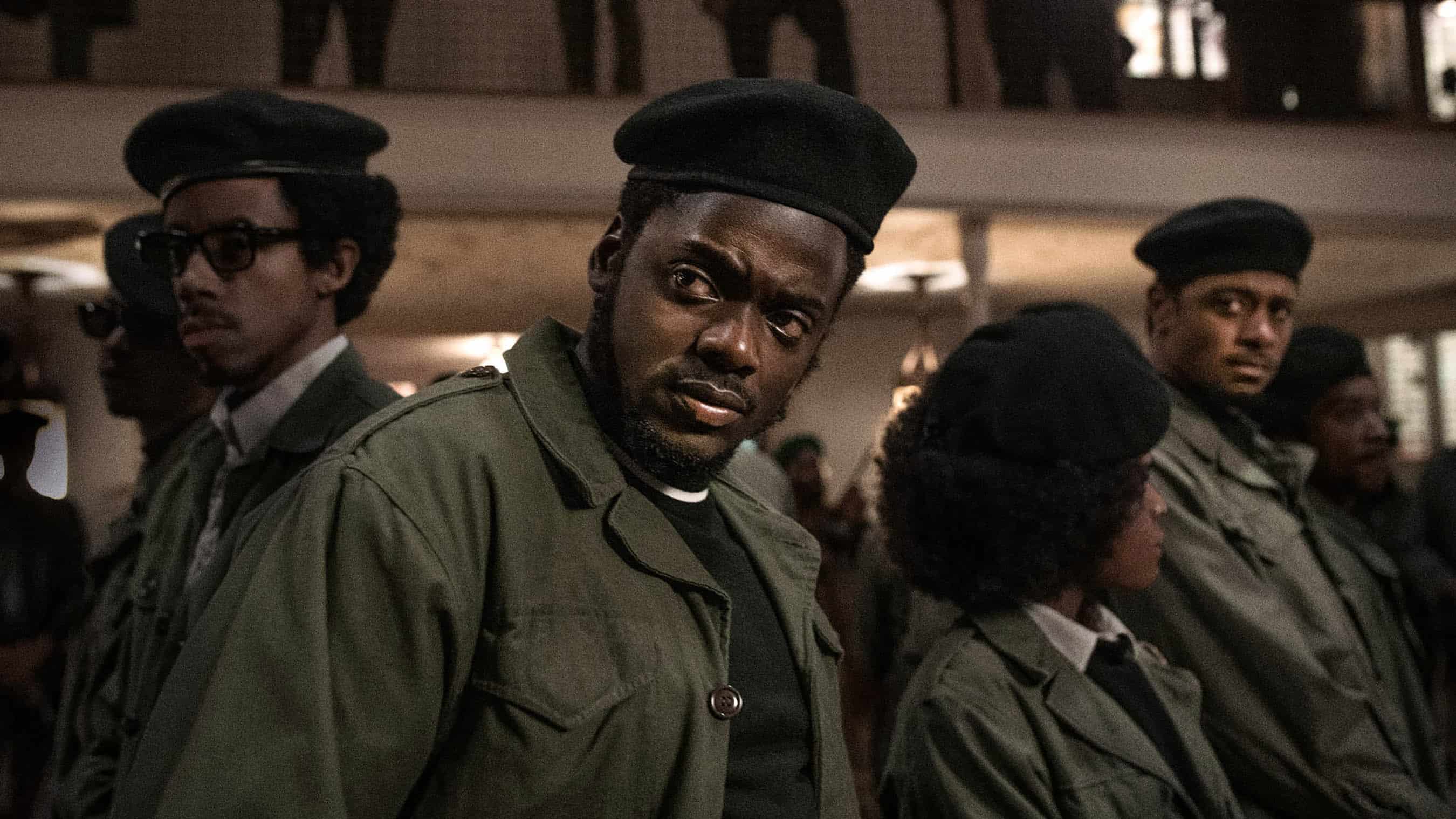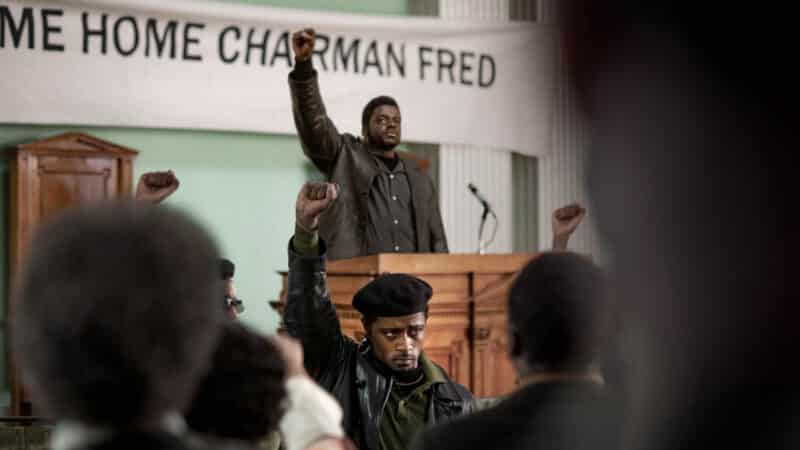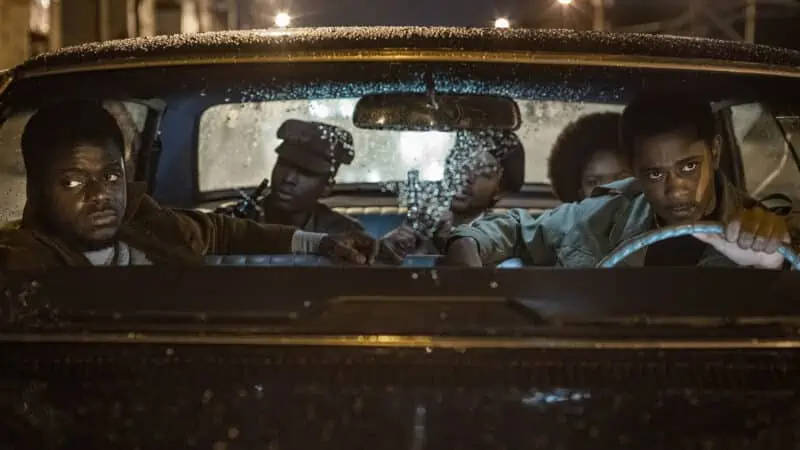Judas And The Black Messiah (2021) – Review/ Summary (with Spoilers)
Like nearly every well-crafted film about Black oppression in America, Judas and the Messiah will enrage you, tire you out, and make you hope J. Edgar Hoover and his enablers, rot in hell.

Spoiler Alert: This summary and review contains spoilers.
Additionally, some images and text may include affiliate links, meaning we may earn a commission or receive products if you make a purchase.
Like nearly every well-crafted film about Black oppression in America, Judas and the Messiah will enrage you, tire you out, and make you hope J. Edgar Hoover and his enablers, rot in hell.
| Director(s) | Shaka King |
| Screenplay By | Will Berson, Shaka King |
| Date Released (Sundance Film Festival) | 2/1/2021 |
| Date Released (HBO Max) | 2/12/2021 |
| Genre(s) | Action, Crime, Drama, Horror, Romance, Young Adult, Biopic, Historical |
| Duration | 2 Hours and 6 Minutes |
| Rating | Not Rated |
| Noted Cast | |
| Bill O’Neill | LaKeith Stanfield |
| Fred Hampton | Daniel Stanfield |
| Judy Harmon | Domonique Thorne |
| Deborah | Dominique Fishback |
| J. Edgar Hoover | Martin Sheen |
This content contains pertinent spoilers. Also, images and text may contain affiliate links, which, if a purchase is made, we’ll earn money or products from the company.
Film Summary
In 1989, the Judas of Judas and The Messiah, Bill O’Neill, did their first and only interview about their time working as an FBI Informant. Throughout the film, we see how they integrated into the Black Panther Party’s Chicago chapter, then ran by Fred Hampton, in the year 1968. It was a time when the great leaders Malcolm X and Martin Luther King Jr. were assassinated, and the *Insert, a multitude of expletives here,* known as J. Edgar Hoover, had a new target. One he didn’t want to be imprisoned because he saw what that did to Huey P. Newton; he wanted Fred Hampton dead – by any means, using whoever the FBI could. So, with charges dangling over his head, Bill did their dirty work and survived to tell the tale.
Things To Note | Question(s) Left Unanswered
- Reason(s) for Film Rating: So much gun violence and blood. However, the film doesn’t show the actual injury, so no skulls blown apart or anything like that.
- Jump Scares/ Laughs/ Tear-Jerking Moments: Even if you are accustomed to bullets flying in action movies, when you hear them at certain times, you’ll first find yourself jumping, then tears flowing.
Collected Quote(s) & .Gifs
A badge is scarier than a gun. Any nigga on the streets can get a gun, sir. A badge is like you got the whole damn army behind you.
— Bill
[…] the difference between revolution and the candy-coated façade of gradual reform: Reform is just the master teaching the slaves how to be better slaves. Under reform, you could take the motherfucking masters out, and the slaves still be doin’ all the work for ’em.
— Fred
Review
Highlights
It Chips Away Any Sense Of Tolerance You’ve Built Up Against Gun Violence
After a certain point, when you watch action movies for years, gun violence just doesn’t shake you. If it happens in real life, be it police brutality or hearing a gun go off, school shootings, etc., you are reminded of the power they wield. However, in movies? The only thing that may shake you is when two people are fighting with their hands, and you hear the blows and bones breaking. Judas and The Black Messiah pushes beyond that.
You see, in most action movies, gun violence is watered down since you know the lead is going to survive no matter how many times they get hit. They can even be standing in plain sight, no cover, and yet mow down everyone without much of a scratch. In Judas and the Black Messiah, you’re reminded you don’t get into a gunfight without losing your life or damn near doing so. And as you watch one character die after another, as it leads up to the one you know did not make it to 2021, you can feel that sense that a gunshot not meaning much chipped away.
Thus making when you hear what might be the two final bullets shot, it may drive you to tears.
The Amount Of Hatred It Instills Into Your Heart
The reason why “Ignorance is bliss” is because once you know, that innocence is gone, and with innocence comes a certain level of naivety. It gives you the ability to have hope and optimism and believe things can change, but as you realize change only comes when someone’s blood hits the ground, it’s frustrating. And with Judas and the Black Messiah generally not holding back, not making that one good white cop or FBI agent, it allows you to be mad. The film allows you to generalize, hate every cop, agent, the United States government, and yet also know, as Fred says, all that you can hope for is reform.
But, as shown by America’s last presidency, all those reforms, made with a pen, can be replaced or made null. For if there is no shame, no desire of atonement, no buy-in from those who inherited the power of former oppressors, then nothing is going to change beyond how openly or covertly things will be done and against who.
The Role of Black Women Is More Visible Than Most Films Focused On The Civil Rights Movement
In modern times, Black women’s role in the movement can often be seen as relegated or nod to, but not necessarily focused on. We won’t pretend Judas and The Black Messiah is largely different, but we do appreciate Judy Harmon’s role throughout the early to the middle part of the film. For as one of Fred’s right hands, she is more than a love interest or maternal figure – she is a soldier, someone of authority even! She pushes the image of Black women in the Black Panther Party, and the movement, beyond the overused footage of Angela Davis speaking. So while not a large role, it honors the militant women who are seldom seen and often unheard.
Daniel Kaluuya Stirs Something Up In You
Acknowledging there is always controversy when Black people, who aren’t American born, play Black American historic figures, it’s hard to not desire to defend Kaluuya as Fred Hampton. Mind you, with the film including archival footage of Hampton at the end of the film, it does push you to realize Kaluuya did put his own spin – to a point. However, the spirit, the energy, the ability to gather people and have them riled up by hearing your words? Oh, between King and Kaluuya, you get the spirit of Hampton as an orator.

And then when you add in the side which isn’t the civil rights icon, just a man who wanted change, who loved his lady, Deborah, and school Bill when he was being misogynist, Kaluuya’s charisma is tapped and hooks you. Making any ill feeling you may have for him being non-American dissipate for while he may not have lived and endured the troubles of American society, let’s not pretend England doesn’t have its own bulls***.
If You Ever Needed A Film Where Black People Fought Back, Instead Of Being The Bigger Person, This Does Give That Cathartic Release
There is honestly nothing more frustrating than when a film stirs up all these feelings in you, with the only release available possibly being crying. This isn’t the best means of letting what often is anger go, for your tears are sometimes an admittance of your own helplessness. But, unlike many films that force you to bear that weight and leave you with no means of release, Judas and the Black Messiah gives you opportunities to have a cathartic moment.
Granted, a lot of the times it leads to someone you like dying, but with every cop killed or act of rebellion, you feel a little less tense. Then with each speech from Hampton, you don’t get the vibe that all you can do is endure, but that you are a revolutionary, and in this shared struggle, each act for your people moves things forward.
And this isn’t to say I condone violence, though pissing on J. Edgar Hoover’s grave does leave me with warm and fuzzy feelings inside. But to take note how much blood has been spilled, bruises delivered, and money paid out to get us, Black Americans, this far, and we’re still fighting? It’s hard to not be thankful, as brutal as Judas and the Black Messiah is, at least it didn’t have Black people solely act as sheep heading towards slaughter.
Overall
Rating: Positive (Worth Seeing) – Recommended
Two hours of Judas and the Black Messiah are guaranteed to leave you exhausted, but also with a touch of pride. Because to think a kid from Chicago became one of the most feared people by the United States Government, that means something. Especially since this was after the deaths of Martin Luther King Jr. and Malcolm X, the two often named members of America’s partial reformation when it comes to race relations. And while knowing Bill O’Neill took part in taking Fred Hampton down to save his own ass, irritates us to no end, again, the film doesn’t leave you with nothing but uncontrollable rage with no outlet. It provides means to blow off steam.

Hence the positive label and recommendation. Judas and the Black Messiah recognizes to tell America’s history as honest as possible, it has to be brutal, raw, and drive you to anger. Yet, unlike many of its contemporaries, it makes sure that it doesn’t leave you without some means to channel that rage back into the film so that it doesn’t abandon you with high blood pressure and the desire to punch a wall.
[ninja_tables id=”46802″]
Images used for editorial and commentary purposes. All rights remain with their respective copyright holders.


